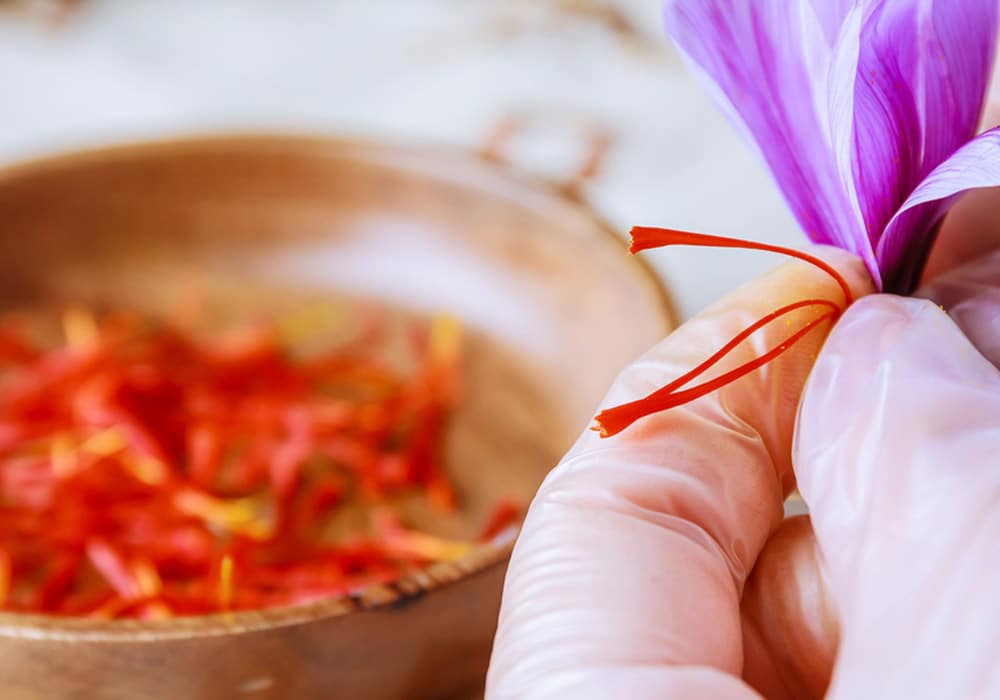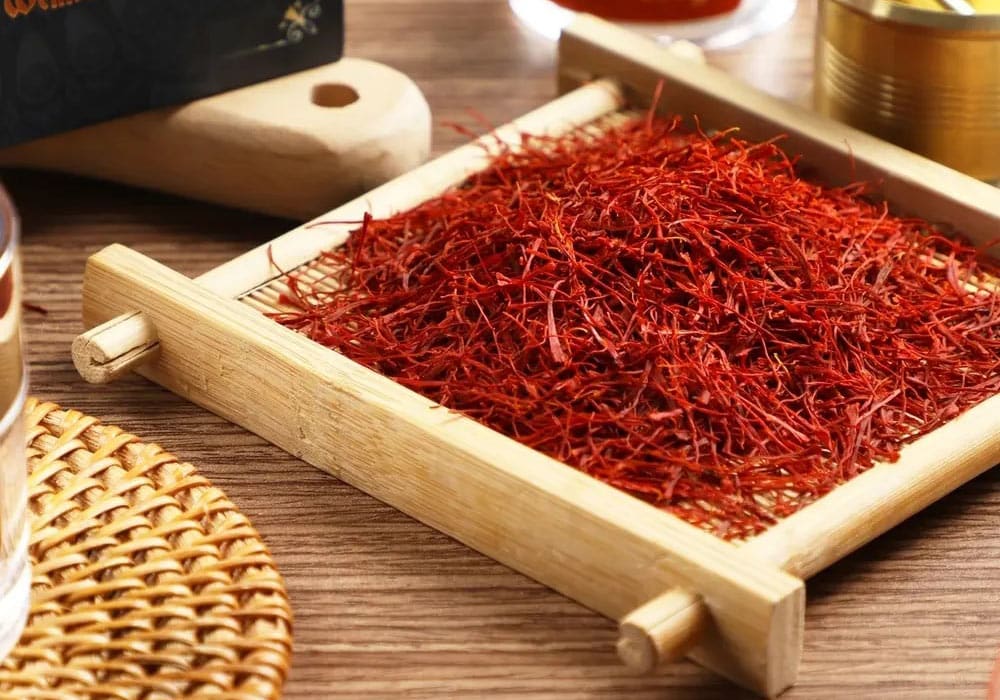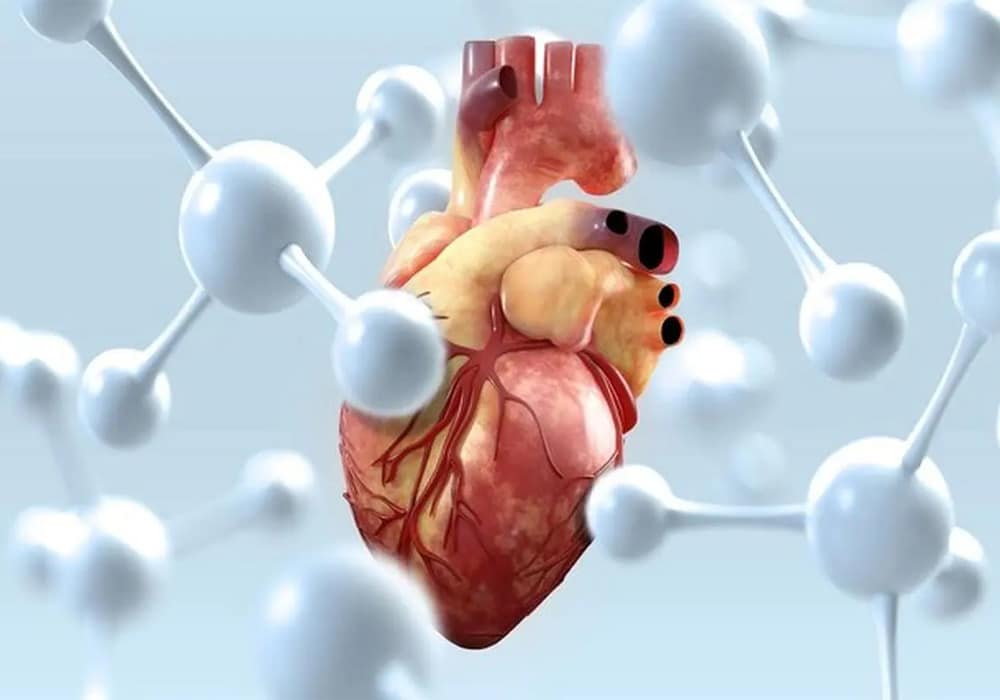Saffron, a highly valuable and aromatic spice that has held a special place in Iranian cuisine and traditional medicine as well as in many countries around the world for centuries, has astonishing medicinal benefits beyond its role as a flavoring and coloring agent. One of the most important therapeutic uses of saffron is its impact on both mental and physical health. Numerous scientific studies have been conducted on the effects of saffron in reducing depression and alleviating menstrual symptoms, yielding very promising results. This article comprehensively examines the medicinal properties of saffron in these two important areas, explaining the scientific reasons and practical applications.
Section One: Understanding Saffron and Its Active Compounds
Saffron is a valuable spice with numerous medicinal properties that has been used since ancient times in traditional medicine to improve health. The active compounds in saffron play a significant role in its positive effects on the body, and understanding these compounds is key to benefiting from the properties of this plant.
Introduction to Saffron
Saffron is derived from the flower of the Crocus sativus plant, and the only usable part is the red-colored stigmas of the flower. Harvesting and drying these stigmas is a labor-intensive and time-consuming process, which has contributed to saffron’s high price and its nickname, “red gold.” Beyond its unique flavor and aroma, saffron has long been used in traditional medicine for treating various diseases, boosting mood, and improving physical conditions due to its bioactive compounds. However, it is important to note that the presence of counterfeit saffron in the market is a major challenge for consumers; poor-quality or adulterated saffron may reduce or even negate its true medicinal benefits and might be harmful. Therefore, sourcing saffron from reputable suppliers and knowing how to identify genuine saffron is crucial.
Active Compounds and Biological Properties of Saffron
Saffron contains several bioactive compounds, each playing an important role in its medicinal effects. The main constituents include crocin, safranal, and picrocrocin. Crocin is one of the strongest antioxidants found in saffron, protecting cells from oxidative damage, preventing premature aging, and neurological disorders. Safranal is responsible for saffron’s pleasant aroma and flavor, as well as its calming and antidepressant properties. Picrocrocin gives saffron its characteristic bitterness and has regulatory effects on the nervous system. Additionally, saffron contains carotenoids and flavonoids that help reduce inflammation, strengthen the immune system, and maintain overall health.
Section Two: Saffron and Depression Reduction
Saffron is recognized as a natural treatment with significant effects on mood improvement and alleviating symptoms of depression. Its active compounds help regulate brain chemicals and increase feelings of calm and happiness.
What Is Depression?
Depression is one of the most common mental disorders worldwide and can have profound impacts on an individual’s life. It is characterized by persistent sadness, loss of motivation and energy, changes in appetite and sleep patterns, and sometimes negative thoughts or suicidal ideation. Depression affects not only mental health but also daily functioning, social relationships, and quality of life. Treatments range from pharmaceutical antidepressants to psychotherapy; however, side effects of chemical drugs and lack of response in some patients have led to interest in safer, more natural alternatives like saffron.
Antidepressant Effects of Saffron
Numerous studies have demonstrated that saffron consumption can reduce depressive symptoms. Interestingly, some research has shown that saffron’s antidepressant effects are comparable to common medications such as fluoxetine. A major advantage of saffron over chemical drugs is that it has almost no significant side effects, making it a much safer natural supplement. Consequently, many people prefer to use saffron as part of complementary or alternative treatment for depression relief.
Mechanisms of Saffron’s Action in Improving Depression
Saffron exerts its positive effects on depression through various mechanisms. One of the most important is increasing serotonin levels in the brain. Serotonin is a neurotransmitter critical for mood regulation, sleep, and appetite. Compounds in saffron such as crocin and safranal enhance serotonin activity, which improves mood and reduces anxiety. Additionally, saffron’s strong antioxidant properties reduce oxidative stress, which can damage cells and worsen depression. Its anti-inflammatory effects also help reduce brain inflammation, which is directly linked to depression.
Clinical Studies and Results
Many clinical studies have shown that daily saffron intake for several weeks can lead to significant improvements in depressive symptoms. For instance, a 2014 study revealed that consuming 30 mg of saffron daily for 8 weeks significantly reduced depression severity in patients. Other studies have demonstrated similar effectiveness to fluoxetine, but with fewer side effects. These scientific findings have made saffron a very promising complementary treatment option.
Section Three: Saffron and Relief of Menstrual Symptoms
Saffron can effectively reduce pain and other unpleasant symptoms associated with menstruation. This natural spice, with its anti-inflammatory and calming properties, helps ease cramps and improve mood during this period.
Common Menstrual Symptoms and Related Problems
Menstruation is a natural part of the female reproductive cycle that occurs monthly but is often accompanied by unpleasant symptoms. Uterine pain, known as dysmenorrhea, is one of the most common issues and can be severe enough to disrupt daily activities. Hormonal changes also cause symptoms such as fatigue, bloating, headaches, and mood swings, collectively called premenstrual syndrome (PMS). These symptoms can significantly impact women’s quality of life and require appropriate management.
Saffron’s Soothing Effects on Menstrual Pain and Symptoms
Thanks to its anti-inflammatory and calming properties, saffron is very effective in relieving menstrual pain. It can reduce inflammation in uterine tissues and act on the nervous system to lessen physical discomfort. Besides pain relief, saffron’s positive effects on mood reduce anxiety and stress caused by PMS, improving overall well-being. This has made saffron a recognized natural and low-risk solution for managing menstrual symptoms.
Mechanisms of Saffron’s Impact on Menstrual Symptoms
Saffron’s effect on menstrual symptoms works through multiple pathways. Firstly, its anti-inflammatory compounds reduce the production of prostaglandins in the uterus. Prostaglandins are the main cause of pain and muscle contractions that intensify menstrual cramps. Reducing these compounds alleviates pain and lessens contractions. Additionally, saffron’s calming effects on the central nervous system reduce tension and anxiety, enhancing mood. Some studies also indicate that saffron can help regulate hormonal balance, thereby reducing PMS symptoms.
Scientific Evidence and Clinical Trials
Several studies have confirmed saffron’s positive impact on menstrual symptoms and PMS. For example, a 2013 study showed that daily consumption of saffron tea for two months significantly decreased menstrual pain and improved mood. Other research found that saffron reduced irritability, depression, and anxiety in women suffering from PMS. Moreover, saffron has helped reduce the need for painkillers in some women, demonstrating its potent and natural effectiveness.
Section Four: How to Use Saffron to Benefit from Its Medicinal Properties
Proper consumption methods and appropriate doses are essential to maximize saffron’s health benefits and avoid potential side effects.
Saffron Tea
One of the easiest and most common ways to use saffron for treating depression and menstrual symptoms is making saffron tea. Simply steep a few quality saffron strands in hot water for 10 to 15 minutes. Drinking one or two cups daily can provide beneficial effects. Adding a little honey or green tea can enhance the flavor. This is a natural and tasty way to enjoy saffron’s therapeutic benefits.
Saffron Supplements
Saffron supplements in capsule or tablet form are available in pharmacies and supplement stores. These products contain standardized doses of saffron’s active compounds and offer a convenient way to access its medicinal effects, especially for those who cannot prepare saffron tea. However, supplements should be taken under medical supervision, especially if the person is on medication or has underlying health conditions.
Culinary Use
Due to its unique flavor and color, saffron is widely used in traditional and modern dishes. Adding saffron to foods like rice, stews, soups, and even beverages is not only visually and gustatorily appealing but also provides a consistent natural method to incorporate its health benefits. Choosing genuine and high-quality saffron preserves its medicinal properties. Regular, moderate use of fresh, high-quality saffron in the diet can gradually improve mental and physical health.
Section Five: Important Notes and Precautions
Although saffron is a natural and beneficial plant, its consumption must follow safety guidelines. Very high doses (more than 5 grams per day) can be toxic and cause serious side effects. Therefore, moderation is essential, especially with supplements and herbal medicines. Pregnant women should be cautious because saffron may induce uterine contractions and risk miscarriage. People taking antidepressants or other medications should consult their doctor before using saffron to avoid drug interactions. Additionally, the quality of saffron is crucial; it must be sourced from reputable suppliers to prevent counterfeit products and ensure real therapeutic effects. If any allergic reactions or adverse symptoms occur, saffron use should be stopped immediately and medical advice sought.
Tida Saffron: A Trusted Source for Premium and Affordable Saffron
Tida Saffron is one of the most reputable sources for purchasing high-quality and economical saffron, offering products with guaranteed authenticity and superior quality. The price of Iranian saffron provided by this company is set fairly to ensure that customers with any budget can enjoy the unique benefits of this precious spice. This company focuses on supplying original and top-grade saffron, combining competitive prices with standardized packaging and fast delivery to provide an easy and reliable shopping experience. Furthermore, Tida Saffron offers expert consultation to help customers choose the best type of saffron to meet their needs, making it a trusted reference among domestic and international buyers.
Conclusion
Saffron, this highly valuable and fragrant spice that has long held a special place in Iranian cuisine and traditional medicine as well as many other countries, offers remarkable medicinal benefits in addition to its flavoring and coloring roles. Its active compounds have numerous positive effects on mental and physical health and are recognized as a natural treatment for issues such as depression and menstrual pain. Multiple studies have demonstrated that saffron can effectively reduce depressive symptoms and relieve pain while improving mood during menstruation. Therefore, this precious spice is more than just a simple seasoning—it is a powerful natural medicine.
Also Read:













